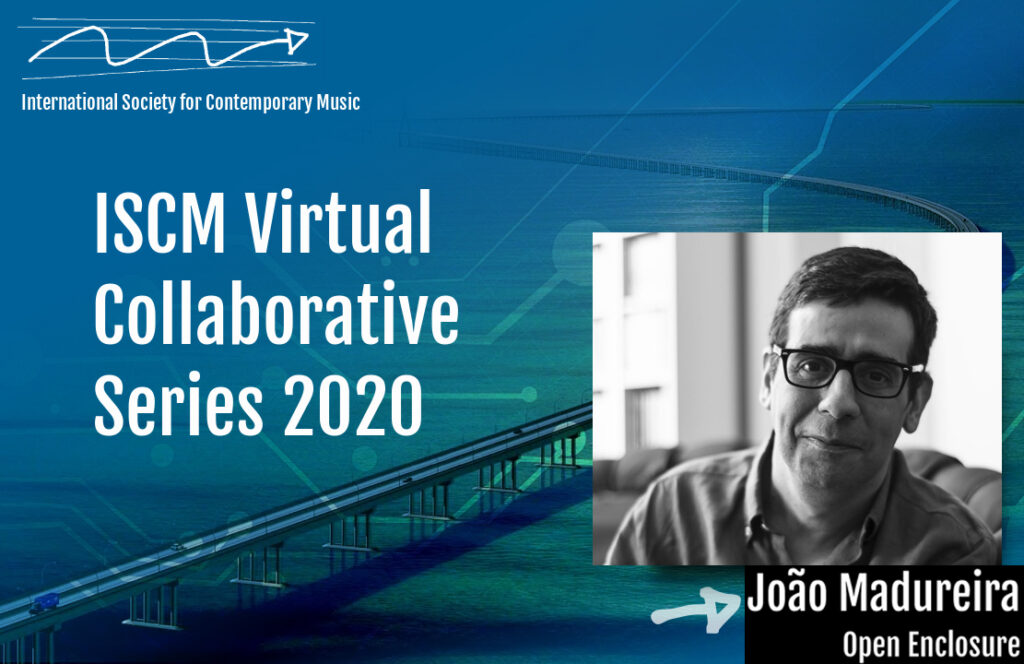João Madureira: Open Enclosure

(Submitted by ISCM – PORTUGUESE SECTION)
The output of Portuguese composer João Madureira (b. 1971) includes orchestral, chamber and operatic music, works for solo instruments, as well as music for film and theatre. His works have been presented at various festivals – in Portugal, throughout Europe, in Asia and South America – by several ensembles such as the Ensemble Neue Musik, the Orchestrutopica, the Remix Ensemble Casa da Música, the Gulbenkian Orchestra, the National Ukrainian Symphonic Orchestra, the Lisbon Contemporary Music Group, the Ensemble L’Itinéraire, the Sond’Ar-te Electric Ensemble, the Portuguese Symphony Orchestra, Sete Lágrimas, the Officium Ensemble and the Lisbon Metropolitan Orchestra.
João Madureira’s works have been commissioned by the Gulbenkian Foundation, Culturgest, Expo’98, Centro Cultural de Belém, IPPAR (Portuguese Institute of the Architectural Patrimony), Casa da Música, Teatro da Cornucópia, Teatro Nacional de São João, the Presidency of the Portuguese Republic, Teatro Nacional D. Maria II, Miso Music Portugal, the International Music Festival in Estoril, the Lisbon Contemporary Music Group, Arte das Musas and the Department of the Historical and Artistic Patrimony of the Diocese in Beja, Santa Casa da Misericórdia de Lisboa and the Fátima Sanctuary.
In October 1998 João Madureira was awarded with the ACARTE/ Maria Madalena Azeredo Perdigão Prize of the Gulbenkian Foundation. The composer’s work has been recorded, edited and released on various labels, such as: la mà de guido, Arte das Musas, Numérica as well as Miso Records.
After mastering Composition in Portugal, João Madureira studied in Italy, Germany and France, with Franco Donatoni, York Höller and Ivan Fedele. In 2007 the University of Aveiro recognized his Composition studies in Germany with the Master’s Degree. In 2017 João Madureira finalized his PhD Thesis in Musical and Historical Science at the Nova University of Lisbon, in which, through the analysis of Luciano Berio’s operatic music, the composer describes the relations between music, politics, and philosophy. João Madureira is professor at the Superior Music School of Lisbon. In his work the composer aims at integrating the various “ruptures” from the history of music, using the techniques and aesthetics both from the 20th and 21st centuries, including serialism and spectralism, as well as from the past. Connected with the aesthetic principles of late postmodernism, in Portugal João Madureira has created a unique voice. He’s interested not only in drawing from various sources such as early music, but also from the culture of Central Africa or extramusical phenomenons – they allow him to include in his compositions different metalinguistic dimensions.
About his 2019 composition Open Enclosure, the composer writes:
After the work Ausgraben und Erinnern (2006, commissioned by the Miso Music Portugal), – which literally means “dig out and remember” – I’ve thought a lot about Luciano Berio’s book with his Harvard lessons entitled Remembering the Future (Harvard University Press, 2006), and particularly about the lesson on “Translating Music”. The act of digging out and remembering – so well described by Walter Benjamin in his text under the same title (in “Imagens de Pensamento” [Thought-Images], vol. 2, translated to Portuguese by João Barrento [Assírio & Alvim, 2006]) –, is actually an act of auto-analysis, present in every musician’s activity. In this Harvard lesson Berio tells us precisely about the gesture of digging out and remembering to defend the notion of transition as an endogenous element in the composer’s work, stretching between more or less explicit forms related with past or unfamiliar elements, and more or less subtle forms involved in their own invention. Now this inevitably happens at the O’culto da Ajuda where the music is permanently translated – from the instruments to the electronics and from the electronics to the instruments –, within a multiple play of mirrors, giving me a lot of pleasure.
Open Enclosure aims at reflecting this intersection in the composer’s invention. The composer is simultaneously open to the outside of his or her own invention where the intruding events ask for transcription/ translation, and closed in his or her own doing, involved in the multiple plans of composition. It’s a piece where I revisit my own writing and at the same time I want to leave its plot, rehearsing new gestures. These gestures emerge from the North American universe of minimal and repetitive music, from popular music as well as from the European heritage which I inevitably carry.
Sond’Ar-te Electric Ensemble
Sílvia Cancela (flute), Nuno Pinto (clarinet), Elsa Silva (piano), Vítor Vieira (violin), and Luís André Ferreira (cello)
Conducted by Pedro Neves
Recorded at the O’culto da Ajuda in Lisbon · November 9th, 2019

ISCM
